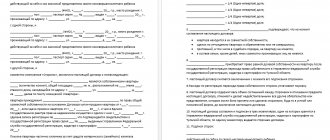Possible options for types of ownership of land plots are defined in the Constitution of the Russian Federation and established by federal legislation. The rights and obligations of owners vary depending on the form of ownership of the land plot. The type of property is established in accordance with the intended purpose of the site, the subject composition and the characteristics of the transformation of one form of ownership into another.
Basic forms of land ownership
In the Russian Federation, the following types of ownership in relation to land plots are distinguished:
- state - federal property and lands owned by federal subjects;
- municipal - land is considered the property of municipalities. It can be disposed of by local authorities; the land is located within the boundaries of the populated area. It is intended to meet the socio-cultural and everyday needs of the population of a particular settlement; it must be used strictly for its intended purpose;
- private – the owners are considered to be individual citizens and collective associations. The land can come into their possession under various conditions. At the same time, individuals and organizations can not only own and use it, but also dispose of it at their own discretion. They also have certain responsibilities;
- mixed - combines the characteristic features of several forms of ownership.
Currently, the most common forms of ownership are state and private.
Based on the form of ownership of a plot of land, certain legal requirements are established.
Common shared ownership of land
Common property can be declared shared property on the basis of an agreement between the participants in the common joint property or, in the absence of such consent, by a court decision (clause 5 of Article 244 of the Civil Code of the Russian Federation). Each of the participants in shared ownership has the right to receive ownership and use of a part of the land plot commensurate with the allocated share (Article 247 of the Civil Code of the Russian Federation). The powers of ownership and use of land, which is common shared property, arise on the basis of an agreement of all its property participants or by a court decision. A participant in common shared ownership who has carried out inseparable improvements to the common property (in this case, a land plot) using his own funds has the right to demand an increase in his share in the appropriate amount. If separable improvements have been made, they are the property of the participant in shared ownership who carried them out (Article 245 of the Civil Code of the Russian Federation). The right of common shared ownership of land presupposes the distribution among all participants in appropriate shares of income, grown fruits and manufactured products entering the common property, unless otherwise provided by an additional agreement (Article 248 of the Civil Code of the Russian Federation). The costs of maintaining a land plot that is in common shared ownership are distributed among all participants in accordance with the size of their shares. In particular, each of the participants is responsible for the timely payment of land tax, submission of a tax return for land tax, payment of land maintenance costs, and more (Article 249 of the Civil Code of the Russian Federation). A participant in common shared ownership has the right to dispose of his share at his own discretion, including, he can transfer his share as a gift or by will, or sell it under a land purchase and sale agreement. In turn, a land plot that is in common shared ownership can be disposed of only on the basis of an agreement of all parties involved. The alienation of a share of property in common property for a fee presupposes the preemptive right of the remaining participants to purchase the share being sold at the cost in the amount at which it is being sold (Article 246 of the Civil Code of the Russian Federation).
Violation of the pre-emptive right to purchase a share gives the right to any of the participants in shared ownership to file a lawsuit within 3 months with a claim to transfer the rights and obligations of the buyer to him.
A land plot that is in common shared ownership and has the ability to be divided can be divided between all participants/co-owners who wish to carry out state registration of ownership of a separate land plot. Carrying out actions to divide the land involves the termination of common shared ownership of a given land plot, and can be carried out by common agreement of all parties or on the basis of a court decision (Article 252 of the Civil Code of the Russian Federation). If it is impossible to separate a share by law or if the division entails disproportionate damage to property, the allocated owner has the right to demand payment to him of the value of his share by the remaining participants in the common shared ownership.
An owner who has received a sum of money or other compensation from the remaining participants in shared ownership for his share loses the right of ownership to his share in the common property.
An indivisible land plot, which is in common shared ownership, involves the payment of the cost of the share to a participant who wishes to allocate his share in kind by other participants (clause 3 of Article 252 of the Civil Code of the Russian Federation).
Characteristics of private property
Private ownership implies the ownership of land by an individual, several citizens who are united by the status of a legal entity, as well as a partnership.
Any land can be converted into personal property. The exception will be those that are officially excluded from circulation or limited.
Such territories include protected areas and areas of the country's forest fund.
In addition to the land plot itself, a citizen owns buildings, trees and other plantings on the territory of the land plot.
The property may include small enclosed bodies of water located on the property.
A distinctive feature of private property is its intended purpose . Goals could be:
- gardening;
- running a personal household;
- construction of a house and other outbuildings;
- construction of a summer house or garage.
You can become a full owner of land if the following conditions are met:
- when receiving a plot as a gift or inheritance . Land belongs to the list of real estate that is allowed to be transferred by gift or on the basis of a will;
- by privatization , which means the transfer of a site from state or municipal property to private property. Citizens can officially register their rights to a land plot that they received free of charge during the Soviet era, when there were no private holdings. The dacha and forest amnesty programs make the privatization procedure accessible to most citizens;
- when completing a purchase and sale transaction . You can buy a plot not only from other citizens, but also from the state by taking part in the auction;
- if exchange transactions or other legal processes in relation to real estate have been carried out.
Owner status will need to be registered in accordance with the law. Information about the plot and its owner is entered into a unified real estate register.
Based on Art. 209 of the Civil Code of the Russian Federation, the right to private property implies:
- possession – the ability to own real estate in accordance with the requirements of the law;
- use - the right to exploit land to obtain any profit and consumer products. This right applies to objects that are the actual property of the owner;
- disposal - the possibility of alienation, transfer by inheritance or under a lease agreement and other options for transferring property to another person.
The owner has the right to dispose of the property at his own discretion. He can sell or give away the plot or a specific part of it for free. The right of disposal also applies to buildings located on the territory of the land plot.
Citizens can give up ownership of a plot on a voluntary basis or unite with other owners to create common property.
The state has the right to limit the powers of the owner. The site may be withdrawn for state or municipal needs, while its value will be reimbursed according to the state assessment.
If the owner commits any offenses, he may be deprived of ownership of the land based on a court decision. No monetary compensation is paid.
The right to land comes upon its registration and entry of the plot into the real estate register.
The owner has the following responsibilities:
- filing a tax return within the deadlines established by law;
- payment of land tax on time;
- compliance with all laws regarding land;
- use of land exclusively for its intended purpose;
- carrying out all activities that can ensure the safety of the land plot.
There are 2 types of private land holdings:
- individual – for individuals and legal entities;
- general - divided into shared and joint.
Land can become common on the basis of certain legislative acts or under an agreement when individual land plots are connected by mutual decision of their owners.
We remind you that even if you thoroughly study all the data that is in the public domain, this will not replace the experience of professional lawyers! To get a detailed free consultation and resolve your issue as reliably as possible, you can contact specialists through the online form .
Kinds
During the existence of the USSR, the only acceptable option for owning plots was state ownership. For this reason, it was not appropriate to conduct a property analysis. Currently, the Constitution states that there are several types of ownership in relation to land.
It is indicated that lands can belong to private individuals, organizations or the state. There are also municipal and public forms of ownership, and mixed types are allowed. Persons in a marriage relationship, as well as members of partnerships and peasant farms, may have rights to own real estate.
The essence of ownership
The more common of the above are the rights of individuals and government bodies. Today, the principles of democracy apply, according to which almost every person can obtain land ownership. Considering what type of property is assigned to the plot, certain rules are established regarding its use.
For example, when the state owns land, it is endowed with different rights compared to the situation if the owner is a citizen.
Private property
Individual citizens, as well as a company carrying out a certain type of activity, can have rights to land plots. In addition to the land itself, the rights extend to buildings located on the site, vegetation, trees and other immovable objects.
Private ownership of land
The exception is the location of a monument of cultural significance on the territory, which cannot be demolished. The state body has the authority to do so. A private person may have closed reservoirs located on the site. They are small in size.
You can obtain the rights to the allotment in question using:
- passing the privatization procedure;
- inheritance legal relations;
- drawing up a deed of gift;
- concluding purchase and sale agreements;
- exchange for other property and other transactions.
It can also be said that the allotment may be part of the contribution that is invested in the capital of the newly created company. Land legislation has a separate provision regarding the ownership rights of private individuals. All powers are described in detail as follows. It is indicated that the owner has the opportunity to own and dispose of the property at his own discretion.
Entity
Civil and land legislation indicates the peculiarities inherent in the procedure for registering rights regarding an allotment for organizations.
It is indicated that such an owner is endowed not only with the powers of ownership, but is also allowed to carry out activities of an economic nature. The owner has the opportunity to own the plot and also carry out actions aimed at its alienation in the manner prescribed by law.
Types of property in settlements
A person can realize the allotment by selling it in full or some part. You can also register a mortgage on the property, draw up a deed of gift, and transfer it through inheritance legal relations. Structures located on the land plot can be alienated separately or together with the plot. This rule is established in land legislation.
To determine the size of the part of the plot that is subject to alienation, the provisions of the Land Code are used. When land is withdrawn from circulation, actions to alienate it cannot be carried out.
It is worth paying attention to the fact that the presence of rights regarding the site implies the presence of responsibilities on the part of the owner. An example is that the owner undertakes to monitor compliance with environmental standards on his site.
Responsibilities also include land surveying requirements, compliance with boundaries established with neighboring plots, and monitoring the environmental condition of the site as a whole. These provisions must be taken into account during the use of plots.
When a person commits actions that violate the boundaries of plots, or the environment is polluted, it is likely that the violator is threatened with visiting the judicial authority conducting proceedings on this issue. If the use does not violate any rights, it can be carried out by the owner in any convenient form.
Public and municipal property
Civil and land legislation contains the nuances of ownership of property owned by the municipality, which is of general importance. It also indicates how ownership of a land plot that was previously recognized as ownerless occurs.
Municipal property rights
Currently, you can find the option of owning plots under consideration:
- on farms engaged in farming and peasant activities;
- partnerships with a horticultural focus;
- collective farms;
- enterprises engaged in agricultural cooperative activities;
- cooperatives engaged in livestock farming activities with a housing and garage orientation.
There are two forms by which ownership of municipal property is carried out. In the first situation, a certain land plot is established for each owner, which becomes his possession (this form is called shared).
Common property right
The second situation is related to the fact that shares in real estate are not subject to determination, since all land is in common ownership. The purpose of creating such a form is to satisfy people's needs. The needs are communal and agricultural in nature.
When a person owns a certain share of land in a municipality, he has the opportunity to realize it through sale. It is worth keeping in mind that those who own the remaining shares of such land have priority rights to purchase.
State uniform
All plots that are not subject to private or municipal ownership are automatically considered Russian property. This rule is enshrined in civil law. There are two levels of state ownership:
- property belonging to the federation;
- property of the regions.
When it comes to ownership at the federal level, we can say that the country has rights to individual land plots. They mean:
- lands where parks and reserves are located;
- plots created for security purposes;
- occupied with space-oriented systems;
- necessary for the location of nuclear power facilities;
- other allotments specified in the Constitution.
The authorities can transfer these territories to municipal ownership on the basis of a lease agreement, as well as to private individuals for the purpose of erecting buildings or growing various crops. A land easement may be established.
The state has the authority to acquire plots of land from private individuals, provided that the lands have been put up for sale.
In territories located in the neighborhood there may be lands owned by the state, but belonging to different categories. Some sites imply that construction work and scientific research may be carried out on their territory. At the same time, it is not permissible to do this on other plots. An example is the territory where parks, nature reserves, etc. are located.
About municipal property
There are 2 options for owning municipal land plots:
- for each owner a certain plot is allocated, the owner of which he becomes (shared form of ownership);
- a specific share is not established, and all land is considered common property.
This type of ownership is typical for gardening associations, farms and peasant households, housing and garage cooperatives, and cooperative agricultural organizations.
The intended purpose of such lands is to meet the agricultural and communal needs of the population. The owner has the right to sell his share in municipal property, but first he must offer it to other shareholders of the farm.
Features of state ownership
In Art. 125 of the Civil Code of the Russian Federation states that all land that is not included in the categories of private and municipal ownership is considered state-owned. At the same time, ownership is possible at the federal level and the level of constituent entities of the Russian Federation.
The rights of the state extend to:
- on lands allocated for research work;
- to protected and park areas;
- to areas that ensure the security of the country;
- to areas allocated for the operation of space systems for nuclear energy;
- to other lands specified in the Constitution of the Russian Federation.
The state has the right to transfer such lands to municipalities or private individuals on the basis of a lease agreement for construction or cultivation of crops. The powers of the state include the ability to buy private lands put up for sale.





